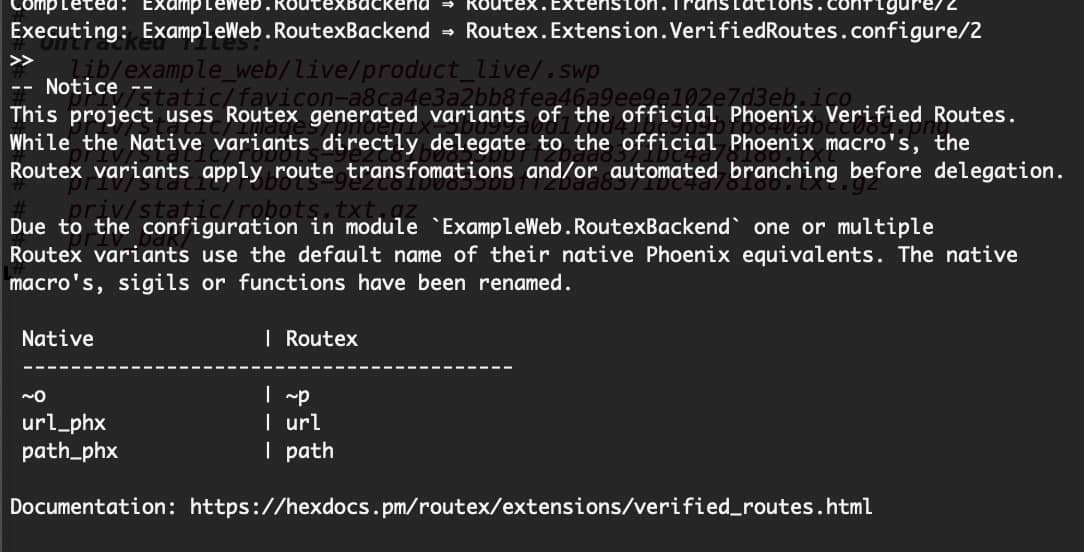UPFRONT
- This thread is an incubator thread; once Routex reaches v1.0 (soon!) it will have an new thread; this one serving for historical purposes.
Routex
TLDR; let’s split up Phoenix Localized Routes - Localized/multilingual routes in Phoenix so developers can pick what features they need instead of importing one ‘do-it-all’, or write features themselves in a few lines of code.
Routex is a framework to extend the functionality of Phoenix Frameworks’ router. Using a pluggable extension system it can transform, extend and generate code based on routes in your Phoenix Framework app.
It ships with a small set of extensions which cover common use cases. Routex provides helper functions to ease writing your own extensions when the default set is not enough.
Top Features and Benefits
- adding router features is plug-and-play
- combine extensions for a multiplier effect
- write powerful extensions with minimal code, no plumbing required
- supports multiple configurations in one router
- extension callbacks have separate responsibilities and a unified interface; they can be individually tested.
Routex.Router
__using__
Macro callback that plugs Routex.Processing between route definition and compilation of the router module.
preprocess_using(routex_backend, opts \ [], list)
Wraps each enclosed route in a scope, marking it for preprocessing by Routex using given routex_backend (a configuration module). opts can be used to partially override values provided by the Routex Backend.
Routex.Processing
This module provides everything needed to process Phoenix routes. It executes the configure callback from extensions to build a configuration to use, transform callbacks to transform Phoenix.Router.Route structs and create_helpers callbacks to create one unified Helper module (see chapter Extensions for details about the callbacks)
Powerful but thin
Although Routext is able to influence the routes in Phoenix applications in profound ways, the framework and it’s extensions are a suprisingly lightweight piece of compile-time middleware. This is made possible by the way router modules are pre-processed by Phoenix.Router itself.
Prior to compilation of a router module, Phoenix Router registers all routes defined in the router module using the attribute @phoenix_routes. Each route is at that moment a Phoenix.Router.Route struct.
Any route enclosed in a preprocesss_using block has received a :private field in which Routex has put which Routex backend to use for preprocessing that particular route. By enumerating the routes, we can process each route using the properties of this backend and set struct values accordingly. This processing is nothing more than (re)mapping the Route structs’ values.
After the processing by Routex is finished, the @phoenix_routes attribute in the router is erased and re-populated with the list of mapped Phoenix.Router.Route structs.
Once the router module enters the compilation stage, Routex is already out of the picture and
route code generation is performed by Phoenix Router as usual.
Routex Extensions
Routex Extensions extend the functionality provided by Routex to transform routes or generate new route based helper functions. Each extension is a module which adopts the Routex.Extension specification. It has to implement one or multiple public functions:
- configure/2
- transform/3
- create_helpers/3
Routex will call those public functions at different stages before Routex hands off the result to Phoenix.Router for compilation.
Stage 1: Configure
This stage enables extensions to preprocess backend options upfront and enables Routex to collect all resulting options in one list. As a result all known options are passed to all extension in subsequent stages.
The configure/2 callback is called with the options provided to Routex and the name of the Routex Backend. It is expected to return a new list of options.
Stage 2: Transform
This stage is meant to adapt the property values in Phoenix.Router.Route structs. The routes are grouped by Routex Backend and processed per group, allowing an extension to use accumulating values within one iteration.
The transform/3 callback is called with a list of routes, the name of the Routex Backend and the current environment. It is expected to return a list of Phoenix.Router.Route structs.
Flattening option values
Extensions can make use of option values provided by Routex itself, Routex Backends and other extensions.
To make the availability of options as predictable as possible, Routex uses a flat structure which is stored in a routes’ private.routex field. However, using a flat structure might conflict with developer experience; sometimes a nested structure to provide configuration options might be more suitable.
One responsibility of the transform/3 callback is to flatten the structure of options the extension uses for each route they receive, so other extensions can use options set by the current extension without knowledge of the initial configuration structure.
Example
The Alternate extension uses nested options and allows inheritance of properties from parent scopes. Notice how the “gb” scope has no :locale set.
scopes: %{
"/" =>
helper: nil,
locale: "en",
scopes: %{
"nl" => %{
helper: "nl",
locale: "nl"
},
"gb" => %{
helper: "gb",
}
}
}
The Alternate extension is therefor responsible for flattening those options for (itself and) other extensions to use. To take the route responsible for the “gb” scope as an example, the extension should add flattened options in the Route struct. It can do so using a helper function.
put_routex_opts([locale: "en", helper: "gb"])
Now the Translation extension can search for the option :locale in the route’s opts, unaware of how that locale was initially configured and by which extension. (swapping the Alternate Extension with CLDR Route Extension should not matter as long as both provide the ‘:locale’ option)
Stage 3: Create helpers
In this stage helper functions can be generated which will be added to MyAppWeb.Router.RoutexHelpers.
The create_helpers/3 callback is called with a list of routes belonging to a configuration module, the name of the configuration module and the current environment. It is expected to return Elixir AST.
As a result the developer only has to import MyAppWeb.Router.RoutexHelpers for all helpers generated by extensions to be included in the app.
Current Status
Routexhas almost feature parity withPhoenix Localized Routes, only one or two extensions yet to be written. Minor modifications might be needed to the backend module / configuration but I consider it a drop-in replacement already (Routex` Assigns extension supports custom namespaces, so I chose @loc for the Example app)- Main modules and their documentation are good enough for alpha release.
- Helper functions to aid writing extensions are good enough for alpha release
- Initial set of extensions is POC quality and documentation has to be written
- Messages printed by extensions have to be deferred to after processing
- Example app uses Routex backend named LocalizedRoutes.
- The Example app compiles and works as expected
==> example
Compiling 13 files (.ex)
Completed: ExampleWeb.LocalizedRoutes ⇒ Routex.Extension.Expansion.configure/2
Completed: ExampleWeb.LocalizedRoutes ⇒ Routex.Extension.Translations.configure/2
Completed: ExampleWeb.LocalizedRoutes ⇒ Routex.Extension.VerifiedRoutes.configure/2
20:56:34.477 [info]
The default sigil used by Phoenix Verified Routes is overridden by Routex due to the configuration in `ExampleWeb.LocalizedRoutes`.
~p: localizes and verifies routes. (override)
~o: only verifies routes. (original)
Documentation: https://hexdocs.pm/routex/extensions/verified_routes.html
Completed: ExampleWeb.LocalizedRoutes ⇒ Routex.Extension.Expansion.transform/3
Completed: ExampleWeb.LocalizedRoutes ⇒ Routex.Extension.Translations.transform/3
Completed: ExampleWeb.LocalizedRoutes ⇒ Routex.Extension.Assigns.transform/3
Completed: ExampleWeb.LocalizedRoutes ⇒ Routex.Extension.Translations.create_helpers/3
Completed: ExampleWeb.LocalizedRoutes ⇒ Routex.Extension.ScopeGetters.create_helpers/3
Completed: ExampleWeb.LocalizedRoutes ⇒ Routex.Extension.Alternatives.create_helpers/3
Completed: ExampleWeb.LocalizedRoutes ⇒ Routex.Extension.VerifiedRoutes.create_helpers/3
Completed: Create or update helper module ExampleWeb.Router.RoutexHelpers
[info] Running ExampleWeb.Endpoint with cowboy 2.9.0 at 127.0.0.1:4000 (http)
[info] Access ExampleWeb.Endpoint at http://localhost:4000
#NOTE: This function returns all values known by Routex; only the values you have chosen are added to 'assigns' the Socket. Hence the duplication.
iex(1)> ExampleWeb.Router.RoutexHelpers.path_values("/europe/nl/producten/3")
%{
assigns: %{
loc: %{
contact: "verkoop@example.nl",
locale: "nl",
name: "The Netherlands",
scope_helper: "europe_nl"
}
},
backend: ExampleWeb.LocalizedRoutes,
contact: "verkoop@example.nl",
locale: "nl",
name: "The Netherlands",
scope_alias: :europe_nl,
scope_helper: "europe_nl",
scope_path: ["europe", "nl"],
scope_prefix: "/europe/nl"
}



























